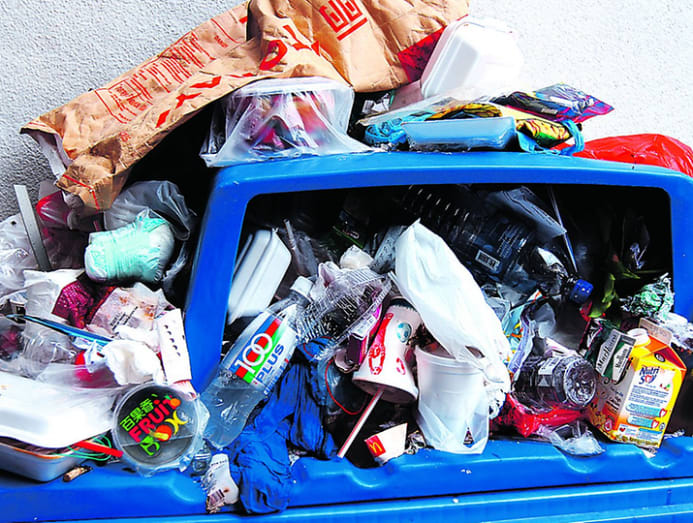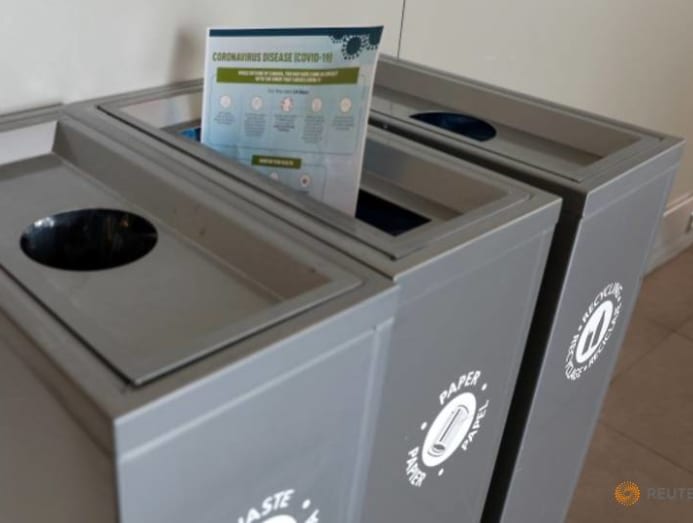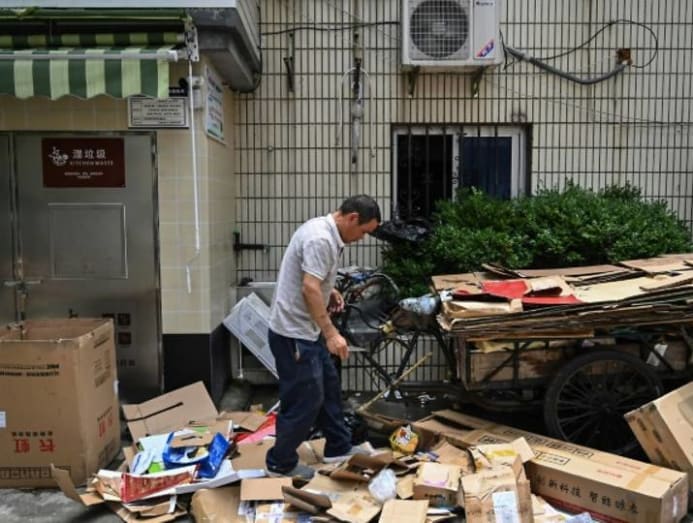Commentary: Why does Singapore still lack a recycling ethos?
SINGAPORE: Having a tradition of beingness respectful to law and government expectations, Singapore has succeeded in reining in the COVID-xix situation.
However, the country is currently experiencing a waste "epidemic". Singapore's recycling charge per unit has sat at a constant low. Co-ordinate to the National Environment Agency (NEA), the domestic recycling rate brutal from 22 per cent in 2022 to 17 per cent in 2019.
This is despite proactive attempts by regulatory authorities to increase the numbers. These attempts have included a "Zero Waste" scheme which improves collection services of recyclable waste as well as incentive structures to encourage recycling.
READ: IN FOCUS: 'It is not like shooting fish in a barrel, but it can exist done' - The challenges of raising Singapore's recycling rate
Recycling companies and environmental activists have too been fairly active in promoting initiatives and providing public instruction almost the benefits of recycling. Despite these efforts, why has the nation non nevertheless formed a stiff recycling ethos?
Are citizens simply unaware of the benefits of recycling? A survey we conducted in 2022 revealed that a majority of Singaporeans expressed stiff support for ecology causes.
Maybe the event may prevarication more than with the highly convenient means through which residents dispose their waste product.
READ: Commentary: We are on the cusp of a plastic recycling revolution
GAPS IN RECYCLING WASTE
The centralised refuse chute (CRC), a typical mainstay of most HDB flats and high-rise condominiums, permits residents to dispose waste in the condolement of their own homes.
The ease of doing so likely discourages residents from expending additional try bringing down their recyclables and depositing them in the vivid blue recycling bins.
A common refrain comes from a typical annotate like this one from a local resident: "If (there are) bulky items similar carboards or large containers, I will bring down to put in the blue bins, but small items like small bottles/glass, I will just throw them from the chute … likewise troublesome to go downstairs to recycle them."
The CRC is a uniquely Singaporean system designed to enable ease of waste disposal rather than ease of recycling.
READ: Commentary: Recycling bins are for recyclables, non junk

Such a disposal system, accessed from the comforts of your own dwelling, is rarely found in other cities around the world.
In Nippon, Taiwan and Republic of korea for example, residents in high-rises have to bring their waste product to central disposal bins on ground level where information technology tin be nerveless by waste collectors.
Compounding the issue are mutual misconceptions about what can and cannot be recycled. This is problematic given how mixing in non-recyclable waste can counter-productively reduce the efficiency of the waste recycling process.
READ: Contamination of recyclables, wrong recycling among possible factors for Singapore's low domestic recycling rate: Experts
It is not that we don't recycle – NEA figures show that over half of Singaporeans engage in recycling practices regularly but they do not have an exhaustive knowledge of what can be recycled or how to dispose of the recyclables properly.
Some misconceptions remain considering there is no immediate feedback or cosmetic activeness to rectify wrong practices. For instance, when recycling bottles, they have to be done start and and then placed in a bin, but this is non usually done.
The mixing of food waste into a recyclables bin would return the entire bin unrecyclable.
A uncomplicated example is a greasy pizza box thrown in with clean cardboard boxes, or half-empty soft drink bottles mixed with empty plastic bottles.

The final gap is how despite taking the care to sort waste matter, during collection, information technology seems that all types of waste are transported and processed for disposal in the same style.
Singaporeans, in letters to newspapers or in online forums, have noticed that recycling trucks only have 1 compartment for all recyclables even though many recycling bins have separate openings and bins for glass, paper and metallic cans.
In this situation, information technology would announced that the hard work in separating these recyclables into the right receptacle are wasted when the collectors so put all of them together in the same collection truck.
It is not widely known that this type of "unmarried-stream recycling", equally information technology is ordinarily done nowadays, takes mixed recyclables to Materials Recovery Facilities where they are and then sorted into the unlike categories of glass, plastic, paper, metals and more.
SIGN Upward: For CNA's Commentary weekly newsletter to explore problems beyond the headlines
WHAT Tin can WE Acquire FROM OTHERS
Is Singapore striking a drinking glass ceiling in the ecology goals nosotros can reach from voluntary recycling?
Looking outwards, most of our Asian neighbours have resorted to a strict enforcement of policy measures to boost recycling rates. Japan may be an ideal case report for how to cultivate a robust recycling culture; information technology too, started off by regulating and enforcing waste direction and recycling polices.
READ: Commentary: Recycling makes you feel less guilty but doesn't change how huge our plastic problem is
In the instance of South Korea, they introduced a unit of measurement pricing strategy for household waste, known as the Volume-based Waste Fee System. Residents were required to purchase standard plastic bags for residual disposal where recyclables are collected at no extra charge.

The recycling rate increased drastically, driven by market-based incentives. In improver to these efforts, South Korea also launched a compulsory nutrient waste matter recycling programme in 2013.
Today, the country'southward food waste recycling rate has peaked at 95 per cent, a sharp increase compared to its 2 per cent in 1995.
In China, Shanghai has also started to mandate recycling practices in the centre of 2019. Acts of noncompliance would be met with a fine of up to 200 yuan (South$40).
READ: Commentary: Why recycling, less single-employ plastics are non the answers to our plastic scourge
Enforcement came in the form of surveillance cameras, alongside an army of volunteers who assisted with the policy's implementation across many residential estates.
Taking a folio out from Japan's playbook, the city's recyclable collection was also conducted at fixed timings of the solar day and at stock-still locations inside the residential estate.
Shanghai's policy implementation was not without hiccups. The policy, requiring citizens to bring their recyclables to assigned drove points, was largely viewed as an unnecessary hassle.
Citizens came up with an like shooting fish in a barrel-to-follow Peppa Hog version for waste product sorting. Household food waste matter refers to what is edible for the sus scrofa, whereas residual wastes are the not-edible ones.
Hazardous waste product would toxicant the pig to death. Recyclables are things yous can sell for coin to purchase more pigs.
READ: Commentary: Wasteful practices of affluence must end
Even though Shanghai has ways to go before they catch up with Japan and Republic of korea's recycling rate, the improvements achieved in such a short period are cipher curt of remarkable.
As Singapore continues to develop and urbanise, waste product accumulation will continue to exist a growing problem. The availability of solutions in neighbouring countries should galvanise Singapore to outset taking bigger steps in pursuit of more effective waste material management strategies.
In our current research, we explore the use of interventions to nudge residents into adopting positive waste recycling behaviours. Much similar how our commonage efforts of mask wearing and social distancing have enabled us to stalk the spread of COVID-19, might we also exist able to dedicate ourselves to the noble cause of protecting our environs?
We think we can, by taking a first step to sort and recycle our waste.
Mind to a conversation about recycling, repairing eastward-waste product and the challenges of a consumerist culture on CNA's Heart of the Matter podcast:
Tong Yen Wah is an Associate Professor at the Chemical and Biomolecular Engineering, National University of Singapore.
Source: https://cnalifestyle.channelnewsasia.com/commentary/commentary-why-does-singapore-still-lack-recycling-ethos-293721
0 Response to "Commentary: Why does Singapore still lack a recycling ethos?"
Enregistrer un commentaire